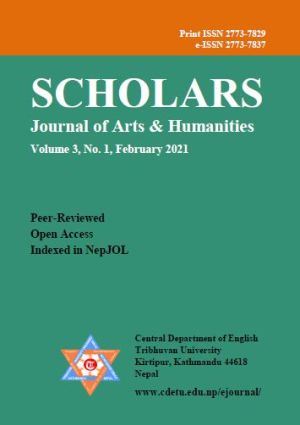Redefining the Society in Hip-Hop Music: A Nepali Perspective
DOI:
https://doi.org/10.3126/sjah.v3i1.35355Keywords:
Rap culture, rap music, hip hop, patriotism, mainstream musicAbstract
Nepali Rapper Utsaha Joshi, aka Uniq poet's title song “Mero Desh Birami” and Chirag Khadka's album 5:55 title song “Samadhi and Aaago ko Jhilko” display intimate relationships between the socio-political and cultural context and the youngsters' powerful voice through music. This paper analyzes rap music as a medium and power to convey socio-cultural values, truth of conspiracy, and interests among youngsters. Both singers have portrayed the mainstream culture, faith, and patriotism, which have shaped people’s minds and behaviours. Rap songs have become so popular among young people who have always been informed by specific phenomenal interests. It has touched the consciousness that shapes the relationship between humans and culture. The road to these rap songs speaks the voice of cultural roots via its elements. To add, rap singers display popular means of conveying cultural intimacy through their music and of introducing a phenomenal symbol of society. However, Nepali Hip-hop redefines a relative degree of social conspiracy rather, it promotes positivity among the youngsters as it motivates and generates energy. Yet, hip-hop generates and navigates a voice of fear, woes, dissatisfaction, disagreement, anxiety, and other sensitive anti-socio-political crimes like rape, homicide, power augmentation game, etc.
Downloads
Downloads
Published
How to Cite
Issue
Section
License
© Central Department of English, Tribhuvan University and Authors




